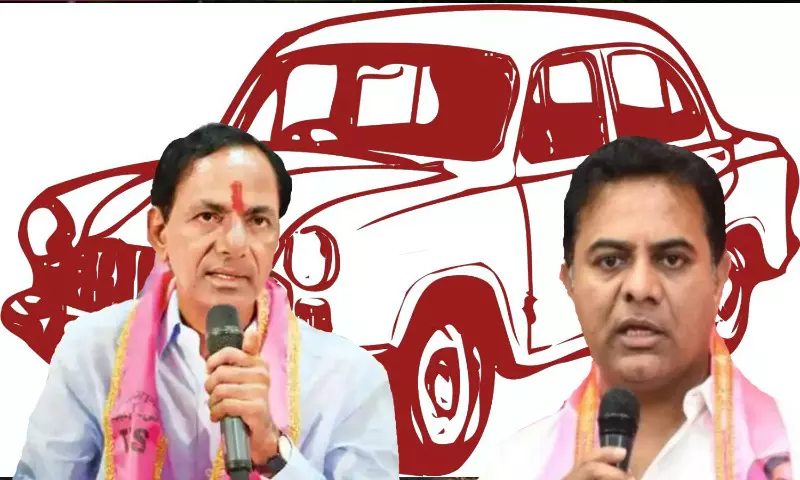TRS party receives Rs 89.15 Cr through electoral bonds in 2019-20; donations nosedives
According to the annual report submitted by TRS to the Election Commission of India, the party has received Rs 39.92 lakh through direction donations (above Rs 20,000) and Rs 89.15 crore via electoral bonds, against Rs 182 received in 2018-19.
By Coreena Suares
Hyderabad:The ruling Telangana Rashtra Samithi (TRS) has received a donation of Rs 89.55 crore for 2019-20. A comparison from the previous year's report revealed that contributions have nosedived by Rs 182 crore, which includes electoral bonds to Rs 89.55 Crore.
According to the annual report submitted by TRS to the Election Commission of India, the party has received Rs 39.92 lakh through direction donations (above Rs 20,000) and Rs 89.15 crore via electoral bonds, against Rs 182 received in 2018-19. It is pertinent to note that the details of donor details remain confidential.
NewsMeter sourced the 2019-20 contribution report and found that 41 individuals/companies donated Rs 39.92 lakhs. TRS party president and Minister for IT & Urban development K. T Rama Rao is the biggest donor who contributed Rs 2.5 lakh. Unlike previous years, not many parliamentarians or MLAs were on the donor's list. Also, the party has delayed the submission of the report. It jumped the September 2020 deadline.
YSRCP
Andhra Pradesh Chief Minister YS Jagan Mohan Reddy led Yuvajana Sramika Rythu Congress Party received a donation of Rs 8.92 Crore for 2019-2020.
The contributions plunged from Rs 181 Crore to Rs 8. 92 Crore in 2020. However, it is pertinent to mention that 2019 was an election year which could also be a reason for the flow of high donations. For 2020, a total of 47 donors including companies and individuals contributed. Interestingly a high number of top donors hail from Tamil Nadu and Hyderabad.
Hyderabad couple, Arimenda Vijaya Sarada Reddy and Arimenda Varaprasad Reddy have contributed Rs 1.2 Crore. JSR Infra developers, whose head office is located in Vellore, donated Rs 2. 5 Crore, the highest. The donors are a mix of companies and individuals.
The report also revealed not many donors from Bengaluru like the previous years. It is to be noted that YSRCP Chief YS Jagan Mohan Reddy owns many properties and companies in the IT hub.
Hyderabad emerges as the fourth city to raise the highest electoral bond value.
An independent analysis conducted by the Association of Democratic Reforms (ADR) has revealed that Hyderabad- is reportedly the fourth city to raise Rs 866.37 Crore worth electoral bonds between March 2018 and January 2021.
While Mumbai tops the list with bonds worth Rs 2020.964 Cr raised followed by Kolkata Rs 1527.458 Cr and New Delhi - 953.86 Cr. A total of Rs 1164.12 Crore worth bonds were raised from four cities including Mumbai, Kolkata, Delhi, and Hyderabad
What is an electoral bond?
An electoral bond is like a promissory note purchased from SBI by the Indian Citizens and Company incorporated in the country. The citizen or company can then donate the bonds to any political party registered under section 29A of the Representation of the Peoples Act, 1951 (43 of 1951) and has secured at least one percent of the votes polled in the most recent General elections or Assembly elections.
Any donors can purchase the electoral; bonds in the first 10 days at the beginning of every quarter which is the first 10 days of April, July, October, and January only from specified SBI bank branches.
The political parties, which receive electoral bonds, en-cash them through the Election Commission of India verified account.These bonds don't bear the name of the donor and the political party might not know the donor's identity. These bonds are valid for only 15 days.
What are known and unknown sources?
Association for Democratic Reforms defines known sources as donations above and below Rs 20,000, whose donor details are available through contribution reports as submitted by regional parties to the Election Commission of India.
While unknown sources are income declared in the Annual Audit reports but without giving source of income for donations below Rs. 20,000. Such includes 'Donations via Electoral Bonds', 'sale of coupons', 'relief fund', 'miscellaneous income', 'voluntary contributions', 'contribution from meetings/ morchas'.